Edie Melson's Blog, page 352
February 10, 2016
PSL, Publishing as a Second Language—What is Genre & How Do I Figure Out Mine?
by Linda Gilden @LindaGilden
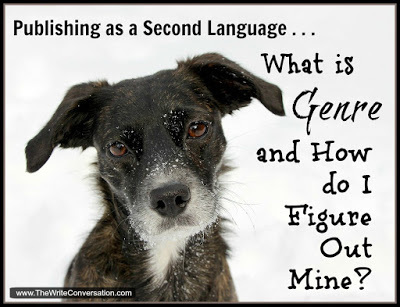 When I started writing one of the strangest words to both my ear and tongue was the word
genre
. It is pronounced ʒɑn·rə or ˈʒɑ̃·rə but even knowing that, the pronunciation seemed awkward.
When I started writing one of the strangest words to both my ear and tongue was the word
genre
. It is pronounced ʒɑn·rə or ˈʒɑ̃·rə but even knowing that, the pronunciation seemed awkward.
After using it for a few years, I began to get used to using this word. It became easier to say and the more I heard it the more common it seemed. But the mystery still remained as to what a genre really is.Simply put the genre is the category or style of a literary work. With fiction, length can also determine the genre of a manuscript. Art and music are also divided into genres but we are only talking about literary genres here. Most genres also contain subgenres.
Some lists have an extra classification or two. But most simply list the basic literary genres as poetry, drama, fiction, and nonfiction.
POETRYAll poetry shares similar rhythm, meter, or form. Poetry genres have expanded to include many forms and are used alone or as a complement to one of the other genres.
DRAMADrama is a literary genre that is performed in front of an audience. Plays, skits, monologues fall into this category with subgenres such as tragedy, comedy, and others.
 NONFICTIONNonfiction is one of the best-known genres. Most people just think of nonfiction as writing that is true and factual. Within the nonfiction genre there are many subgenres that writers and readers can choose. A simple way to think about subgenres is to ask where you would find the book in a bookstore. In what section or classification would this book be shelved?
NONFICTIONNonfiction is one of the best-known genres. Most people just think of nonfiction as writing that is true and factual. Within the nonfiction genre there are many subgenres that writers and readers can choose. A simple way to think about subgenres is to ask where you would find the book in a bookstore. In what section or classification would this book be shelved?
Subgenres in nonfiction include essays, biographies/autobiographies, self-help, devotions, memoirs, personal experience, reference, textbooks, and more. Lists vary and new subgenres appear every now and then as trends change.
FICTIONFiction is a huge and very popular genre that uses literary techniques to engage and entertain readers. Many readers think of fiction as storytelling on paper. There are many aspects to writing fiction and there are many subgenres in this category. Some of the most popular fiction subgenres are adventure, children, romance, suspense, science fiction, historical, speculative, women’s, thriller, educational, and many more. And, within the fiction genre, you will find that most of these subgenres have subgenres. So the list could be endless.
But once you realize what the main literary genres are and how each one gives way to many subgenres, you will begin to understand how each category is broken down and what the specific characteristics of each is. If you are a visual person, you can compare it somewhat to making an outline. You have a main part (literature) that is divided into a few smaller parts (main genres). Then under each of those could be many subgenres and so on.
So the next time you are talking to other writers and they ask, “What genre do you write?” don’t hesitate. Know the category of your writing and boldly speak your answer!
TWEETABLES
Publishing as a Second Language - What is Genre? @LindaGilden on @EdieMelson (Click to Tweet)
Publishing as a Second Language - How to Figure Out What Genre We're #Writing - @LindaGilden (Click to Tweet)
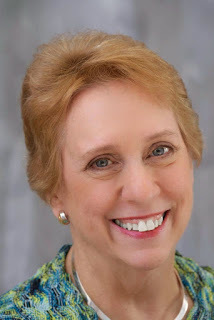 Linda Gilden is a wife, mother, and grandmother. She finds great joy (and excellent writing material) in time spent with her family. Helping writers understand PSL is one of the things she also loves to do through her newest book, Called to Write. This month she is excited about having a chance to set new goals for the new year and maybe even do a few more rewrites!
Linda Gilden is a wife, mother, and grandmother. She finds great joy (and excellent writing material) in time spent with her family. Helping writers understand PSL is one of the things she also loves to do through her newest book, Called to Write. This month she is excited about having a chance to set new goals for the new year and maybe even do a few more rewrites!
To find out more about Linda, her writing, and her ministry, visit www.lindagilden.com . You can also connect with her on Twitter @LindaGilden and Facebook at Author Linda Gilden.
 When I started writing one of the strangest words to both my ear and tongue was the word
genre
. It is pronounced ʒɑn·rə or ˈʒɑ̃·rə but even knowing that, the pronunciation seemed awkward.
When I started writing one of the strangest words to both my ear and tongue was the word
genre
. It is pronounced ʒɑn·rə or ˈʒɑ̃·rə but even knowing that, the pronunciation seemed awkward.After using it for a few years, I began to get used to using this word. It became easier to say and the more I heard it the more common it seemed. But the mystery still remained as to what a genre really is.Simply put the genre is the category or style of a literary work. With fiction, length can also determine the genre of a manuscript. Art and music are also divided into genres but we are only talking about literary genres here. Most genres also contain subgenres.
Some lists have an extra classification or two. But most simply list the basic literary genres as poetry, drama, fiction, and nonfiction.
POETRYAll poetry shares similar rhythm, meter, or form. Poetry genres have expanded to include many forms and are used alone or as a complement to one of the other genres.
DRAMADrama is a literary genre that is performed in front of an audience. Plays, skits, monologues fall into this category with subgenres such as tragedy, comedy, and others.
 NONFICTIONNonfiction is one of the best-known genres. Most people just think of nonfiction as writing that is true and factual. Within the nonfiction genre there are many subgenres that writers and readers can choose. A simple way to think about subgenres is to ask where you would find the book in a bookstore. In what section or classification would this book be shelved?
NONFICTIONNonfiction is one of the best-known genres. Most people just think of nonfiction as writing that is true and factual. Within the nonfiction genre there are many subgenres that writers and readers can choose. A simple way to think about subgenres is to ask where you would find the book in a bookstore. In what section or classification would this book be shelved?Subgenres in nonfiction include essays, biographies/autobiographies, self-help, devotions, memoirs, personal experience, reference, textbooks, and more. Lists vary and new subgenres appear every now and then as trends change.
FICTIONFiction is a huge and very popular genre that uses literary techniques to engage and entertain readers. Many readers think of fiction as storytelling on paper. There are many aspects to writing fiction and there are many subgenres in this category. Some of the most popular fiction subgenres are adventure, children, romance, suspense, science fiction, historical, speculative, women’s, thriller, educational, and many more. And, within the fiction genre, you will find that most of these subgenres have subgenres. So the list could be endless.
But once you realize what the main literary genres are and how each one gives way to many subgenres, you will begin to understand how each category is broken down and what the specific characteristics of each is. If you are a visual person, you can compare it somewhat to making an outline. You have a main part (literature) that is divided into a few smaller parts (main genres). Then under each of those could be many subgenres and so on.
So the next time you are talking to other writers and they ask, “What genre do you write?” don’t hesitate. Know the category of your writing and boldly speak your answer!
TWEETABLES
Publishing as a Second Language - What is Genre? @LindaGilden on @EdieMelson (Click to Tweet)
Publishing as a Second Language - How to Figure Out What Genre We're #Writing - @LindaGilden (Click to Tweet)
 Linda Gilden is a wife, mother, and grandmother. She finds great joy (and excellent writing material) in time spent with her family. Helping writers understand PSL is one of the things she also loves to do through her newest book, Called to Write. This month she is excited about having a chance to set new goals for the new year and maybe even do a few more rewrites!
Linda Gilden is a wife, mother, and grandmother. She finds great joy (and excellent writing material) in time spent with her family. Helping writers understand PSL is one of the things she also loves to do through her newest book, Called to Write. This month she is excited about having a chance to set new goals for the new year and maybe even do a few more rewrites!To find out more about Linda, her writing, and her ministry, visit www.lindagilden.com . You can also connect with her on Twitter @LindaGilden and Facebook at Author Linda Gilden.
Published on February 10, 2016 01:00
February 9, 2016
Frozen in Place—Don't Let Negative Self Talk Freeze Your Writing
by Cindy Sproles @CindyDevoted
 Fourteen inches of snow had fallen three days earlier. Rain pelted down the fourth day. Yet when I opened the door to head out, it was the most beautiful sight I’d ever seen. After the rain, the temperature dropped, and as the mountains are famous for their beautiful morning foggy mists—the fog had frozen. It was like you could lift your finger and break the air.
Fourteen inches of snow had fallen three days earlier. Rain pelted down the fourth day. Yet when I opened the door to head out, it was the most beautiful sight I’d ever seen. After the rain, the temperature dropped, and as the mountains are famous for their beautiful morning foggy mists—the fog had frozen. It was like you could lift your finger and break the air.
I gawked, took pictures and when I came home and sat down to write, I found myself in a frozen fog. It wasn’t writer’s block. My thoughts simply froze as solid as the mountain midst.
It’s crunch time on the novel and as I enter the last 15K words to completion, self-doubt punched at my gut.
It’s probably not good enough. You know folks will compare it to the best seller you had last time. What makes you think you can actually pull off two in a row?
Doubt strikes at the most inopportune times. Without warning we’re plunking away at our work when our fingers grow cold. The confidence we’ve exuberated over the last year, suddenly vanishes. I know very few writers who can honestly say they’ve never experienced a tad bit of self-doubt. Our work has been accepted by readers. We’ve grow a base of followers who wait anxiously for the next book. The attitude we’ve developed becomes recognized. Why on earth would we let doubt get a foot in the door?
I know very few writers who can honestly say they’ve never experienced a tad bit of self-doubt. Our work has been accepted by readers. We’ve grow a base of followers who wait anxiously for the next book. The attitude we’ve developed becomes recognized. Why on earth would we let doubt get a foot in the door?
Self-doubt is part of human nature and despite the claims of others, everyone experiences it. Whether it be in your writing or in a personal decision. Everyone questions themselves at one time or another. The key is not allowing it to become a guiding force.
When self-doubt attacks you and your writing take steps to combat the dreadful beast.
*Nix excuses: It’s easy as pie to conjure a hundred reasons why you can’t write. The kids, the car is in the shop, you have a ballgame…yea, yea, yea – anything else? Excuses give us permission to rationalize why we can’t work. We become our own worst enemy. So stop it. Fight the self-doubt you hear in your head, then sit down and write.
*Avoid the “Jobs Friends” in your life: Stay clear of those well-meaning friends who find reasons why you can’t get into the swing of writing. Think of poor Job as his wife and friends kept pounding him with all the reasons that caused him such grief. Surround yourself with a tribe of individuals who, 1) understand writing 2) love you enough to boot your rear when you start to doubt your abilities 3) will serve as accountability buddies.
*Self-assessment: A good self-assessment is good for us. It helps us refocus on the goals we’ve set for ourselves. It allows us to revisit our successes and see that we are capable, able, and smart enough to do the work. Self-assessment acts as a reset button. Just like rebooting the computer clears out the things that causes issues, a fast re-evaluation of yourself, does the same. You’ll see, you’re pretty good at what you do and that you reignite your passion for the work. So occasionally – reboot.
 *Give yourself a break: And I don’t mean ice cream and a Coke. I mean, ease up on yourself. Give yourself an opportunity to step back and take a breath. Life does pile up and it takes its toll. It’s easy to have compassion for others, but every now and then, have a little compassion on yourself. You are, after all, human. You need rest, food, relaxation – we all need some respite. You’ll find when you allow yourself some leeway, that you get your feet back under you and work becomes a joy again. Love your job of writing. Don’t dread it. If you need to give yourself a rest. Take one. But remember, once you go on vacation, you do have to come home and work. You can’t come back from a time of respite and kick your feet up to do nothing.
*Give yourself a break: And I don’t mean ice cream and a Coke. I mean, ease up on yourself. Give yourself an opportunity to step back and take a breath. Life does pile up and it takes its toll. It’s easy to have compassion for others, but every now and then, have a little compassion on yourself. You are, after all, human. You need rest, food, relaxation – we all need some respite. You’ll find when you allow yourself some leeway, that you get your feet back under you and work becomes a joy again. Love your job of writing. Don’t dread it. If you need to give yourself a rest. Take one. But remember, once you go on vacation, you do have to come home and work. You can’t come back from a time of respite and kick your feet up to do nothing.
*Trust who you are as a writer: Don’t wait for validation from others. You may never get it. Trust your skill and the talent God has blessed to you. Step out and write. Your validation comes from the completion of your work. That’s a success. Don’t let self-doubt turn to fear and convince you that failure is imminent. It’s not. Trust yourself. Trust in the God who has gifted you. Believe you will make a difference. Because you will.
*Start typing: You can’t write if you allow self-doubt to prevent you from working. Everything you write will not have a home, but if you never write it – you’ll never know. So start American entrepreneur and author, Seth Godin has a great cure for self-doubt. Godin says to “Start shipping!” In other words, do something. Anything. Continue to work at the craft. If you never write the words, complete a project, or make an effort, you have no goods to ship. But when you start to work, that part of you that loves writing, becomes a burning passion. The bigger the burn, the more you produce. Now you can send out those manuscripts and proposals because you have projects to send. Start typing. “Start shipping.”
Doubt is the seed that becomes weeds in our work. Don’t let it take hold and overtake your writing yard.
By lunch, the beauty of the frozen fog was gone. Water dripped from the trees and the white frosty haze was a memory. I allowed myself thirty-minutes to freeze, then I placed my fingers on the keys and wrote. Don’t let self-doubt be the icy voice that freezes up your writing. Defrost and write.
TWEETABLES
Frozen in Place—Don't Let Negative Self Talk Freeze Your #Writing - @CindyDevoted (Click to Tweet)
Tips to help when you're frozen in place with your #writing - @CindyDevoted on @EdieMelson (Click to Tweet)
 Cindy Sproles is an author and popular speaker. She is the cofounder of Christian Devotions ministries and managing editor of Straight Street Books and SonRise Devotionals, imprints of Lighthouse Publishing of the Carolinas. Cindy is the executive editor of www.christiandevotions.us and www.inspireafire.com. She teaches at writers conferences nationwide and directs The Asheville Christian Writers Conference - Writers Boot Camp.
Cindy Sproles is an author and popular speaker. She is the cofounder of Christian Devotions ministries and managing editor of Straight Street Books and SonRise Devotionals, imprints of Lighthouse Publishing of the Carolinas. Cindy is the executive editor of www.christiandevotions.us and www.inspireafire.com. She teaches at writers conferences nationwide and directs The Asheville Christian Writers Conference - Writers Boot Camp.
She is the author of two devotionals, He Said, She Said - Learning to Live a Life of Passion and New Sheets - Thirty Days to Refine You into the Woman You Can Be. Cindy's debut novel, Mercy's Rain, is available at major retailers. Visit Cindy at www.cindysproles.com and book her for your next conference or ladies retreat. Also connect with her on Facebook and Twitter.
 Fourteen inches of snow had fallen three days earlier. Rain pelted down the fourth day. Yet when I opened the door to head out, it was the most beautiful sight I’d ever seen. After the rain, the temperature dropped, and as the mountains are famous for their beautiful morning foggy mists—the fog had frozen. It was like you could lift your finger and break the air.
Fourteen inches of snow had fallen three days earlier. Rain pelted down the fourth day. Yet when I opened the door to head out, it was the most beautiful sight I’d ever seen. After the rain, the temperature dropped, and as the mountains are famous for their beautiful morning foggy mists—the fog had frozen. It was like you could lift your finger and break the air. I gawked, took pictures and when I came home and sat down to write, I found myself in a frozen fog. It wasn’t writer’s block. My thoughts simply froze as solid as the mountain midst.
It’s crunch time on the novel and as I enter the last 15K words to completion, self-doubt punched at my gut.
It’s probably not good enough. You know folks will compare it to the best seller you had last time. What makes you think you can actually pull off two in a row?
Doubt strikes at the most inopportune times. Without warning we’re plunking away at our work when our fingers grow cold. The confidence we’ve exuberated over the last year, suddenly vanishes.
 I know very few writers who can honestly say they’ve never experienced a tad bit of self-doubt. Our work has been accepted by readers. We’ve grow a base of followers who wait anxiously for the next book. The attitude we’ve developed becomes recognized. Why on earth would we let doubt get a foot in the door?
I know very few writers who can honestly say they’ve never experienced a tad bit of self-doubt. Our work has been accepted by readers. We’ve grow a base of followers who wait anxiously for the next book. The attitude we’ve developed becomes recognized. Why on earth would we let doubt get a foot in the door?Self-doubt is part of human nature and despite the claims of others, everyone experiences it. Whether it be in your writing or in a personal decision. Everyone questions themselves at one time or another. The key is not allowing it to become a guiding force.
When self-doubt attacks you and your writing take steps to combat the dreadful beast.
*Nix excuses: It’s easy as pie to conjure a hundred reasons why you can’t write. The kids, the car is in the shop, you have a ballgame…yea, yea, yea – anything else? Excuses give us permission to rationalize why we can’t work. We become our own worst enemy. So stop it. Fight the self-doubt you hear in your head, then sit down and write.
*Avoid the “Jobs Friends” in your life: Stay clear of those well-meaning friends who find reasons why you can’t get into the swing of writing. Think of poor Job as his wife and friends kept pounding him with all the reasons that caused him such grief. Surround yourself with a tribe of individuals who, 1) understand writing 2) love you enough to boot your rear when you start to doubt your abilities 3) will serve as accountability buddies.
*Self-assessment: A good self-assessment is good for us. It helps us refocus on the goals we’ve set for ourselves. It allows us to revisit our successes and see that we are capable, able, and smart enough to do the work. Self-assessment acts as a reset button. Just like rebooting the computer clears out the things that causes issues, a fast re-evaluation of yourself, does the same. You’ll see, you’re pretty good at what you do and that you reignite your passion for the work. So occasionally – reboot.
 *Give yourself a break: And I don’t mean ice cream and a Coke. I mean, ease up on yourself. Give yourself an opportunity to step back and take a breath. Life does pile up and it takes its toll. It’s easy to have compassion for others, but every now and then, have a little compassion on yourself. You are, after all, human. You need rest, food, relaxation – we all need some respite. You’ll find when you allow yourself some leeway, that you get your feet back under you and work becomes a joy again. Love your job of writing. Don’t dread it. If you need to give yourself a rest. Take one. But remember, once you go on vacation, you do have to come home and work. You can’t come back from a time of respite and kick your feet up to do nothing.
*Give yourself a break: And I don’t mean ice cream and a Coke. I mean, ease up on yourself. Give yourself an opportunity to step back and take a breath. Life does pile up and it takes its toll. It’s easy to have compassion for others, but every now and then, have a little compassion on yourself. You are, after all, human. You need rest, food, relaxation – we all need some respite. You’ll find when you allow yourself some leeway, that you get your feet back under you and work becomes a joy again. Love your job of writing. Don’t dread it. If you need to give yourself a rest. Take one. But remember, once you go on vacation, you do have to come home and work. You can’t come back from a time of respite and kick your feet up to do nothing. *Trust who you are as a writer: Don’t wait for validation from others. You may never get it. Trust your skill and the talent God has blessed to you. Step out and write. Your validation comes from the completion of your work. That’s a success. Don’t let self-doubt turn to fear and convince you that failure is imminent. It’s not. Trust yourself. Trust in the God who has gifted you. Believe you will make a difference. Because you will.
*Start typing: You can’t write if you allow self-doubt to prevent you from working. Everything you write will not have a home, but if you never write it – you’ll never know. So start American entrepreneur and author, Seth Godin has a great cure for self-doubt. Godin says to “Start shipping!” In other words, do something. Anything. Continue to work at the craft. If you never write the words, complete a project, or make an effort, you have no goods to ship. But when you start to work, that part of you that loves writing, becomes a burning passion. The bigger the burn, the more you produce. Now you can send out those manuscripts and proposals because you have projects to send. Start typing. “Start shipping.”
Doubt is the seed that becomes weeds in our work. Don’t let it take hold and overtake your writing yard.
By lunch, the beauty of the frozen fog was gone. Water dripped from the trees and the white frosty haze was a memory. I allowed myself thirty-minutes to freeze, then I placed my fingers on the keys and wrote. Don’t let self-doubt be the icy voice that freezes up your writing. Defrost and write.
TWEETABLES
Frozen in Place—Don't Let Negative Self Talk Freeze Your #Writing - @CindyDevoted (Click to Tweet)
Tips to help when you're frozen in place with your #writing - @CindyDevoted on @EdieMelson (Click to Tweet)
 Cindy Sproles is an author and popular speaker. She is the cofounder of Christian Devotions ministries and managing editor of Straight Street Books and SonRise Devotionals, imprints of Lighthouse Publishing of the Carolinas. Cindy is the executive editor of www.christiandevotions.us and www.inspireafire.com. She teaches at writers conferences nationwide and directs The Asheville Christian Writers Conference - Writers Boot Camp.
Cindy Sproles is an author and popular speaker. She is the cofounder of Christian Devotions ministries and managing editor of Straight Street Books and SonRise Devotionals, imprints of Lighthouse Publishing of the Carolinas. Cindy is the executive editor of www.christiandevotions.us and www.inspireafire.com. She teaches at writers conferences nationwide and directs The Asheville Christian Writers Conference - Writers Boot Camp. She is the author of two devotionals, He Said, She Said - Learning to Live a Life of Passion and New Sheets - Thirty Days to Refine You into the Woman You Can Be. Cindy's debut novel, Mercy's Rain, is available at major retailers. Visit Cindy at www.cindysproles.com and book her for your next conference or ladies retreat. Also connect with her on Facebook and Twitter.
Published on February 09, 2016 01:00
February 8, 2016
The TWO Most Important Things that will Take Your Social Media to the Next Level
by Edie Melson @EdieMelson
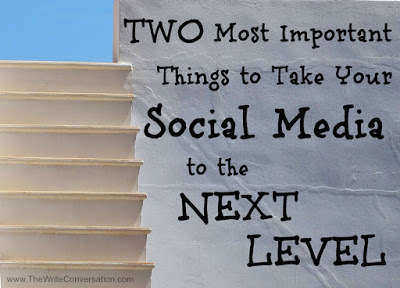 I teach social media all over the country. My students include writers, authors, ministries, even businesses. I’m asked over and over again for the secrets to my own success. Everyone is looking for that insider tip that can take social media to the next level.
I teach social media all over the country. My students include writers, authors, ministries, even businesses. I’m asked over and over again for the secrets to my own success. Everyone is looking for that insider tip that can take social media to the next level.
Today I’m going to give you 2 of them.
But I’ve got to warn you, they’re not some difficult algorithm or complicated series of steps.
The simplicity of what I’m about to tell you will cause many to shake their heads and walk away. These tips seem too easy to work. Truthfully though, they are the secret to my own success.TWO Most Important Things that will Take Your Social Media to the Next Level1. Don’t talk about yourself, your product, your book, or your blog very often. I can see the head shaking from here. I can also hear the questions.
I’m doing social media to get found and to get work out about my book. How can I do that when I don’t talk about it?
Bear with me while I explain.
Think for a minute about what you like and don’t like when you’re on social media. Do you like to read posts asking you to buy a book, post a review, read a blog? Unless you’re in a very tiny minority the answer is NO. None of us is on social media to read commercials. We get enough of those on television and in magazines.
For me, I’m on social media to connect with others. I want to see what’s going on in my friends’ lives. I want to see pictures and share life.
I follow other authors because I want to know THEM. I love to get to know the person behind the book.
 I hate social media posts selling me something.I don’t mind an occasional sneak peek at a new cover or sharing the joy at the first box of books to arrive. But I hate post after post trying to sell me something.
I hate social media posts selling me something.I don’t mind an occasional sneak peek at a new cover or sharing the joy at the first box of books to arrive. But I hate post after post trying to sell me something.
That is why I instituted Edie’s 5 to 1 Rule. I never wanted to be the source of more commercials (I call it noise) on the Internet.
When we stop talking about ourselves, we take the focus off of ourselves and put it where it should be—on others.
I promote others by sharing things they post. Even for others, I don’t do a lot of “buy this book” posts, because too much can read like a commercial. I find things that I find valuable and I share those.
By doing this, I build trust with my audience. What I’ve found is that when they trust me, they will go to the mat to support me. It’s that simple.
 Practice small, consistent steps.2. Practice small, consistent steps. By this I mean, no more than 30 minutes a day on social media 4 – 5 days a week. BUT do it consistently.
Practice small, consistent steps.2. Practice small, consistent steps. By this I mean, no more than 30 minutes a day on social media 4 – 5 days a week. BUT do it consistently.
Social media success is found in momentum. Momentum is built through consistency. If we spend two hours on social media one day, then don’t set foot on it again for several weeks, everything we’ve built has evaporated and we’re back to square one.
By spending even only 5 – 10 minutes on social media 3 – 4 days a week, we can begin to build momentum. And it’s those small steps, done consistently that give us amazing progress when we do them over weeks and months.
I hope you’re not too disappointed, but these two things really are the secret to my success. I’d like to know what you’ve found to take your social media to the next level. Be sure to leave your thoughts in the comments section below.
Don’t forget to join the conversation!Blessings,Edie
TWEETABLES2 Most Important Things to Take Your #SocialMediato the Next Level - @EdieMelson (Click to Tweet)
2 Simple tips from @EdieMelson will take #SocialMedia to the next level (Click to Tweet)
 I teach social media all over the country. My students include writers, authors, ministries, even businesses. I’m asked over and over again for the secrets to my own success. Everyone is looking for that insider tip that can take social media to the next level.
I teach social media all over the country. My students include writers, authors, ministries, even businesses. I’m asked over and over again for the secrets to my own success. Everyone is looking for that insider tip that can take social media to the next level. Today I’m going to give you 2 of them.
But I’ve got to warn you, they’re not some difficult algorithm or complicated series of steps.
The simplicity of what I’m about to tell you will cause many to shake their heads and walk away. These tips seem too easy to work. Truthfully though, they are the secret to my own success.TWO Most Important Things that will Take Your Social Media to the Next Level1. Don’t talk about yourself, your product, your book, or your blog very often. I can see the head shaking from here. I can also hear the questions.
I’m doing social media to get found and to get work out about my book. How can I do that when I don’t talk about it?
Bear with me while I explain.
Think for a minute about what you like and don’t like when you’re on social media. Do you like to read posts asking you to buy a book, post a review, read a blog? Unless you’re in a very tiny minority the answer is NO. None of us is on social media to read commercials. We get enough of those on television and in magazines.
For me, I’m on social media to connect with others. I want to see what’s going on in my friends’ lives. I want to see pictures and share life.
I follow other authors because I want to know THEM. I love to get to know the person behind the book.
 I hate social media posts selling me something.I don’t mind an occasional sneak peek at a new cover or sharing the joy at the first box of books to arrive. But I hate post after post trying to sell me something.
I hate social media posts selling me something.I don’t mind an occasional sneak peek at a new cover or sharing the joy at the first box of books to arrive. But I hate post after post trying to sell me something.That is why I instituted Edie’s 5 to 1 Rule. I never wanted to be the source of more commercials (I call it noise) on the Internet.
When we stop talking about ourselves, we take the focus off of ourselves and put it where it should be—on others.
I promote others by sharing things they post. Even for others, I don’t do a lot of “buy this book” posts, because too much can read like a commercial. I find things that I find valuable and I share those.
By doing this, I build trust with my audience. What I’ve found is that when they trust me, they will go to the mat to support me. It’s that simple.
 Practice small, consistent steps.2. Practice small, consistent steps. By this I mean, no more than 30 minutes a day on social media 4 – 5 days a week. BUT do it consistently.
Practice small, consistent steps.2. Practice small, consistent steps. By this I mean, no more than 30 minutes a day on social media 4 – 5 days a week. BUT do it consistently. Social media success is found in momentum. Momentum is built through consistency. If we spend two hours on social media one day, then don’t set foot on it again for several weeks, everything we’ve built has evaporated and we’re back to square one.
By spending even only 5 – 10 minutes on social media 3 – 4 days a week, we can begin to build momentum. And it’s those small steps, done consistently that give us amazing progress when we do them over weeks and months.
I hope you’re not too disappointed, but these two things really are the secret to my success. I’d like to know what you’ve found to take your social media to the next level. Be sure to leave your thoughts in the comments section below.
Don’t forget to join the conversation!Blessings,Edie
TWEETABLES2 Most Important Things to Take Your #SocialMediato the Next Level - @EdieMelson (Click to Tweet)
2 Simple tips from @EdieMelson will take #SocialMedia to the next level (Click to Tweet)
Published on February 08, 2016 01:00
February 5, 2016
Writers, Rewrite the Masters to Improve Your Writing
by Bruce Brady @BDBrady007
 The other day I began reading a New York Times best-selling novel with a critical eye and noticed something I thought odd. It could have been written better.
The other day I began reading a New York Times best-selling novel with a critical eye and noticed something I thought odd. It could have been written better.
Don’t get me wrong. I’m not saying I’m better than that author. I’m certainly not. My point here is to make us all aware of a couple truths, and an idea.First, The fact that it was a best-selling novel and could have been better written, proves to me that story is king. If we write compelling stories, the reader will forgive grammatical errors and less than perfect structure. Our stories, whether fiction or nonfiction, must engage our readers. It’s possible for us to write perfect sentences and paragraphs, and still bore the reader to death.
Test me on this. Think of your favorite book, then see if it isn’t the story that captures you. When writing, I urge you to focus on story and leave English Composition for later. In fact, leave it to others who are more savvy in this area, if you’re like me.
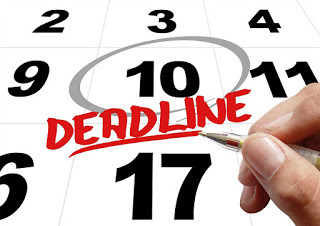 Second, Under the pressure to meet deadlines, we all—writers and editors—will make and miss mistakes. We’re human. In the process of rewriting, there comes a point where we’re just plain tired of reading the same story over and over. Exhaustion breeds errors. Also, we will skip over our own errors while mentally inserting the words we intended. Readers do the same thing. And editors are readers.
Second, Under the pressure to meet deadlines, we all—writers and editors—will make and miss mistakes. We’re human. In the process of rewriting, there comes a point where we’re just plain tired of reading the same story over and over. Exhaustion breeds errors. Also, we will skip over our own errors while mentally inserting the words we intended. Readers do the same thing. And editors are readers.
Turn off your inner-editor and read a book for pleasure. Then re-read it with a critical eye and see if you inserted some words that just seemed right but weren’t there. I know I do this often. It’s natural.
Finally, as I was mentally rewriting portions of this best-seller, the Lord hit me with an idea that may be helpful for you as well. He told me to finish reading the story, then go back and rewrite those sentences that I felt could have been better. The beauty of this exercise is that it will help me—and perhaps you—become a better writer.
So I challenge you to conduct your own rewrites of some of your favorite authors and see if it doesn’t improve your writing. Please don’t ever use their names in discussions or postings. This is not about criticizing another writer. It’s about challenging yourself to be the best storyteller you can be.
I’d love to hear your thoughts on this. Let’s keep the conversation going in the comments section.
TWEETALBLE
Writers, rewrite the masters to improve your #writing - thoughts from @BDBrady007 (Click to Tweet)
 Bruce Brady is an author, writer and playwright. His work has appeared in Focus on the Family’s Thriving Family, www.ChristianDevotions.us, and on stage. Currently, Bruce is working on a Young Adult Novel about a boy who must deal with the death of his dad, being bullied, and helping his mom through her grief. His first five pages took third place in the ACFW South Carolina Chapter’s “First Five Pages” contest.
Bruce Brady is an author, writer and playwright. His work has appeared in Focus on the Family’s Thriving Family, www.ChristianDevotions.us, and on stage. Currently, Bruce is working on a Young Adult Novel about a boy who must deal with the death of his dad, being bullied, and helping his mom through her grief. His first five pages took third place in the ACFW South Carolina Chapter’s “First Five Pages” contest.
When he’s not writing, Bruce spends time learning from and helping other writers. He serves as Mentor of Word Weavers International’s Online Chapter, and as a member of Cross ‘N’ Pens, The Writer’s Plot, ACFW’s National and South Carolina Chapters.
“My dream is to entertain my readers and give them hope as they travel the rocky road of life.”
 The other day I began reading a New York Times best-selling novel with a critical eye and noticed something I thought odd. It could have been written better.
The other day I began reading a New York Times best-selling novel with a critical eye and noticed something I thought odd. It could have been written better.Don’t get me wrong. I’m not saying I’m better than that author. I’m certainly not. My point here is to make us all aware of a couple truths, and an idea.First, The fact that it was a best-selling novel and could have been better written, proves to me that story is king. If we write compelling stories, the reader will forgive grammatical errors and less than perfect structure. Our stories, whether fiction or nonfiction, must engage our readers. It’s possible for us to write perfect sentences and paragraphs, and still bore the reader to death.
Test me on this. Think of your favorite book, then see if it isn’t the story that captures you. When writing, I urge you to focus on story and leave English Composition for later. In fact, leave it to others who are more savvy in this area, if you’re like me.
 Second, Under the pressure to meet deadlines, we all—writers and editors—will make and miss mistakes. We’re human. In the process of rewriting, there comes a point where we’re just plain tired of reading the same story over and over. Exhaustion breeds errors. Also, we will skip over our own errors while mentally inserting the words we intended. Readers do the same thing. And editors are readers.
Second, Under the pressure to meet deadlines, we all—writers and editors—will make and miss mistakes. We’re human. In the process of rewriting, there comes a point where we’re just plain tired of reading the same story over and over. Exhaustion breeds errors. Also, we will skip over our own errors while mentally inserting the words we intended. Readers do the same thing. And editors are readers.Turn off your inner-editor and read a book for pleasure. Then re-read it with a critical eye and see if you inserted some words that just seemed right but weren’t there. I know I do this often. It’s natural.
Finally, as I was mentally rewriting portions of this best-seller, the Lord hit me with an idea that may be helpful for you as well. He told me to finish reading the story, then go back and rewrite those sentences that I felt could have been better. The beauty of this exercise is that it will help me—and perhaps you—become a better writer.
So I challenge you to conduct your own rewrites of some of your favorite authors and see if it doesn’t improve your writing. Please don’t ever use their names in discussions or postings. This is not about criticizing another writer. It’s about challenging yourself to be the best storyteller you can be.
I’d love to hear your thoughts on this. Let’s keep the conversation going in the comments section.
TWEETALBLE
Writers, rewrite the masters to improve your #writing - thoughts from @BDBrady007 (Click to Tweet)
 Bruce Brady is an author, writer and playwright. His work has appeared in Focus on the Family’s Thriving Family, www.ChristianDevotions.us, and on stage. Currently, Bruce is working on a Young Adult Novel about a boy who must deal with the death of his dad, being bullied, and helping his mom through her grief. His first five pages took third place in the ACFW South Carolina Chapter’s “First Five Pages” contest.
Bruce Brady is an author, writer and playwright. His work has appeared in Focus on the Family’s Thriving Family, www.ChristianDevotions.us, and on stage. Currently, Bruce is working on a Young Adult Novel about a boy who must deal with the death of his dad, being bullied, and helping his mom through her grief. His first five pages took third place in the ACFW South Carolina Chapter’s “First Five Pages” contest.When he’s not writing, Bruce spends time learning from and helping other writers. He serves as Mentor of Word Weavers International’s Online Chapter, and as a member of Cross ‘N’ Pens, The Writer’s Plot, ACFW’s National and South Carolina Chapters.
“My dream is to entertain my readers and give them hope as they travel the rocky road of life.”
Published on February 05, 2016 01:00
February 4, 2016
A Writer's Fear
by Lynn H Blackburn @LynnHBlackburn
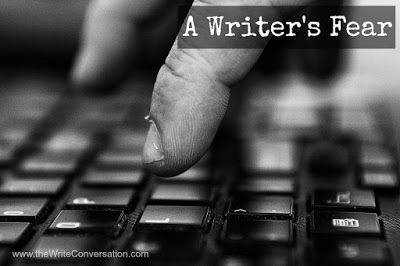 A few weeks ago, I watched a
live Adele concert
. The lucky people who filled the venue were an enthusiastic audience. There were cheers, applause, and the occasional sing-a-long when she sang a favorite.
A few weeks ago, I watched a
live Adele concert
. The lucky people who filled the venue were an enthusiastic audience. There were cheers, applause, and the occasional sing-a-long when she sang a favorite.
I’m a fan so I enjoyed it immensely, but I couldn’t help but be struck by her vulnerability. She stood on the stage and poured herself into each song, even though she wasn’t sure of the response she would get. At one point, she wiped tears from her eyes and told the crowd how nervous she was and how afraid she’d been that they wouldn’t like her new songs.
As I watched, I kept thinking, “She’s Adele for crying out loud! What does she have to be afraid of? How does she not know that people are going to love it?”
When it was over the cameras followed her off the stage, all the way to a waiting elevator where she threw herself into the arms of her boyfriend . . . and sobbed.
It’s an image I’ve been unable to shake.Even if you aren’t a fan of her music, it’s impossible to deny Adele’s success. Her voice is instantly recognizable. Her songs debut at number one on the charts and stay there for weeks. Even in this digital age, her albums have shattered sales records.
If Adele is still worried about how her music will be received, what does that say for those of us putting our art into the world for the first, second, or third time?
 I’m no expert on what it’s like to live a creative life over the long run, but I can tell you a few things about what it feels like to be new to the publishing game.I’m currently working on edits so I can send my next project to my agent and I’m hoping it will become my second published novel.
I’m no expert on what it’s like to live a creative life over the long run, but I can tell you a few things about what it feels like to be new to the publishing game.I’m currently working on edits so I can send my next project to my agent and I’m hoping it will become my second published novel.
I did okay with my first book. I didn’t get hate mail, anyway. Most of my friends still make eye contact and they seem to want to see anther story, so I don’t think they are faking it when they say they liked it.
But I’m scared.
What if they don’t like it? What if I get horrible reviews? What if I get “fan” letters full of advice for how I could have done it better? What if I can’t ever write another book?
The truth is that most days I feel like a fraud. As hard as it was to learn to say, “I’m a writer,” I’m finding it even harder to say, “I’m an author.”
I used to think I was the only person neurotic enough to entertain such notions, but as I watched Adele sobbing in the elevator, it hit me.
It’s always going to be hard.
There is no measure of success that will change that.
There aren’t enough awards or accolades in the universe to make it any easier to be vulnerable. As long as we keep writing from a place of truth, releasing our books, stories, ideas, and poems into the world is going to be terrifying.
Now, as I consider my manuscript and how nervous I am about sending it to my agent, I’m choosing to accept the fear as part of the process. Instead of seeing it as a weakness that needs to be overcome, I’m looking at it as evidence of the pieces of my heart that fill those pages. I’m viewing it as proof that I’m dreaming big dreams.
I don’t know where you are on your writing journey, but whatever your stage is—fiction, nonfiction, poetry—get out there and pour yourself into every word and then hit send. You don’t have to outgrow your fear to be successful, but you do have to act despite your fear.
Query the agent.
Enter the contest.
Attend the conference.
You’ll never regret it.
So how about you? What “stage” are you afraid to step out on? Have you ever passed on an opportunity because you were scared? Have any tips for handling fear?
Let’s talk about it in the comments.
Don’t forget to join the conversation!
TWEETABLESA Writer's Fear - tips & thoughts from author @LynnHBlackburn on @EdieMelson (Click to Tweet)
There aren’t enough awards or accolades to make it easier to be vulnerable -@LynnHBlackburn (Click to Tweet)
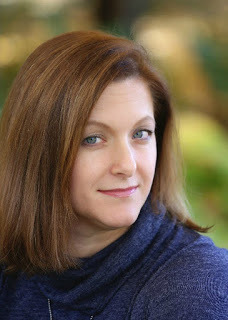 Lynn Huggins Blackburn believes in the power of stories, especially those that remind us that true love exists, a gift from the Truest Love.
Lynn Huggins Blackburn believes in the power of stories, especially those that remind us that true love exists, a gift from the Truest Love.
She’s passionate about CrossFit, coffee, and chocolate (don’t make her choose) and experimenting with recipes that feed both body and soul.
She lives in South Carolina with her true love, Brian, and their three children. You can follow her real life happily ever after at http://www.lynnhugginsblackburn.com.
 A few weeks ago, I watched a
live Adele concert
. The lucky people who filled the venue were an enthusiastic audience. There were cheers, applause, and the occasional sing-a-long when she sang a favorite.
A few weeks ago, I watched a
live Adele concert
. The lucky people who filled the venue were an enthusiastic audience. There were cheers, applause, and the occasional sing-a-long when she sang a favorite.I’m a fan so I enjoyed it immensely, but I couldn’t help but be struck by her vulnerability. She stood on the stage and poured herself into each song, even though she wasn’t sure of the response she would get. At one point, she wiped tears from her eyes and told the crowd how nervous she was and how afraid she’d been that they wouldn’t like her new songs.
As I watched, I kept thinking, “She’s Adele for crying out loud! What does she have to be afraid of? How does she not know that people are going to love it?”
When it was over the cameras followed her off the stage, all the way to a waiting elevator where she threw herself into the arms of her boyfriend . . . and sobbed.
It’s an image I’ve been unable to shake.Even if you aren’t a fan of her music, it’s impossible to deny Adele’s success. Her voice is instantly recognizable. Her songs debut at number one on the charts and stay there for weeks. Even in this digital age, her albums have shattered sales records.
If Adele is still worried about how her music will be received, what does that say for those of us putting our art into the world for the first, second, or third time?
 I’m no expert on what it’s like to live a creative life over the long run, but I can tell you a few things about what it feels like to be new to the publishing game.I’m currently working on edits so I can send my next project to my agent and I’m hoping it will become my second published novel.
I’m no expert on what it’s like to live a creative life over the long run, but I can tell you a few things about what it feels like to be new to the publishing game.I’m currently working on edits so I can send my next project to my agent and I’m hoping it will become my second published novel. I did okay with my first book. I didn’t get hate mail, anyway. Most of my friends still make eye contact and they seem to want to see anther story, so I don’t think they are faking it when they say they liked it.
But I’m scared.
What if they don’t like it? What if I get horrible reviews? What if I get “fan” letters full of advice for how I could have done it better? What if I can’t ever write another book?
The truth is that most days I feel like a fraud. As hard as it was to learn to say, “I’m a writer,” I’m finding it even harder to say, “I’m an author.”
I used to think I was the only person neurotic enough to entertain such notions, but as I watched Adele sobbing in the elevator, it hit me.
It’s always going to be hard.
There is no measure of success that will change that.
There aren’t enough awards or accolades in the universe to make it any easier to be vulnerable. As long as we keep writing from a place of truth, releasing our books, stories, ideas, and poems into the world is going to be terrifying.
Now, as I consider my manuscript and how nervous I am about sending it to my agent, I’m choosing to accept the fear as part of the process. Instead of seeing it as a weakness that needs to be overcome, I’m looking at it as evidence of the pieces of my heart that fill those pages. I’m viewing it as proof that I’m dreaming big dreams.
I don’t know where you are on your writing journey, but whatever your stage is—fiction, nonfiction, poetry—get out there and pour yourself into every word and then hit send. You don’t have to outgrow your fear to be successful, but you do have to act despite your fear.
Query the agent.
Enter the contest.
Attend the conference.
You’ll never regret it.
So how about you? What “stage” are you afraid to step out on? Have you ever passed on an opportunity because you were scared? Have any tips for handling fear?
Let’s talk about it in the comments.
Don’t forget to join the conversation!
TWEETABLESA Writer's Fear - tips & thoughts from author @LynnHBlackburn on @EdieMelson (Click to Tweet)
There aren’t enough awards or accolades to make it easier to be vulnerable -@LynnHBlackburn (Click to Tweet)
 Lynn Huggins Blackburn believes in the power of stories, especially those that remind us that true love exists, a gift from the Truest Love.
Lynn Huggins Blackburn believes in the power of stories, especially those that remind us that true love exists, a gift from the Truest Love. She’s passionate about CrossFit, coffee, and chocolate (don’t make her choose) and experimenting with recipes that feed both body and soul.
She lives in South Carolina with her true love, Brian, and their three children. You can follow her real life happily ever after at http://www.lynnhugginsblackburn.com.
Published on February 04, 2016 01:00
February 3, 2016
The Value of a Critique Group And/Or Writing Partner
by Edie Melson @EdieMelson
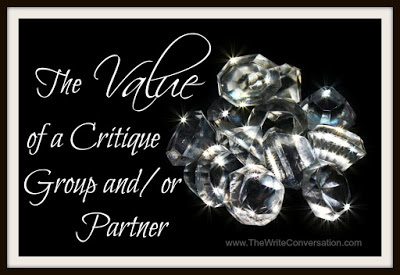 I field a lot of questions about the value of having a critique group and/or partner. There are as many answers as there are writers. But there are very few who are able to produce publishable writing in a vacuum.
I field a lot of questions about the value of having a critique group and/or partner. There are as many answers as there are writers. But there are very few who are able to produce publishable writing in a vacuum.
For me personally, I wouldn’t be where I am today as a writer if wasn’t for the groups who have nurtured me along the way.Although we tend to think of writing as a primarily solitary pursuit, writing for publication is an endeavor built on forging relationships. And those relationships can ultimately determine our success or failure in the writing industry. Here’s a list of those relationships.Between you and other writersBetween you and the readerBetween the reader and the subject or charactersBetween you and the editorBetween you and your agent
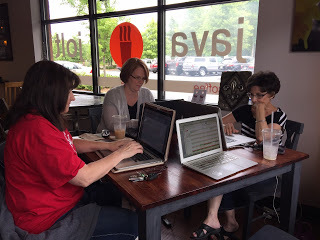 I listed the relationship between writers first, because surprisingly, it’s often the most vital in our writer’s life. The actual act of putting words on paper is a solitary act and because of that it’s easy to lose perspective.
I listed the relationship between writers first, because surprisingly, it’s often the most vital in our writer’s life. The actual act of putting words on paper is a solitary act and because of that it’s easy to lose perspective.
Writing in a vacuum can give us a false sense of whether or not we’re effective in our endeavor. We either wind up thinking we’re a genius or sink into the depths of despair because we can’t string two coherent sentences together. Rarely is either perspective accurate.
We need others in our profession to give us feedback, keep us grounded and provide encouragement. You may be tempted, like I was at first, to insert friends and family into this role. Unless they’re also writers this dynamic just doesn’t work. They’ll unwittingly encourage you when you need a swift kick in the pants and administer the kick in the pants when you need encouragement.
That’s where a writers group, critique group or critique partner will help. But you have to be careful—some critique and writers groups can be toxic. I’ve visited some where the purpose appears to be to build up the one delivering the critique by tearing down the hapless author. You want to avoid these groups at all cost.
Here’s a list of what to look for in a group or a partnerAn encouraging atmosphere –not all sweetness and light—nobody improves on false compliments. But I’ve almost never found a manuscript that didn’t have some redeeming quality. A mutually beneficial relationship. You should both bring something valuable if it’s a partnership—you may excel at writing dialogue and your partner is a whiz at description.A hunger to improve. If it’s a group there should be a movement toward growth in the majority of members. Even if you’re all beginners, if you’re all reading writing books and attending classes you’ll be able to grow and learn together.A timekeeper. If someone’s not willing to keep track of the time not everyone will get a chance to be critiqued. It’s a dirty job, but someone’s got to do it!
A mutually beneficial relationship. You should both bring something valuable if it’s a partnership—you may excel at writing dialogue and your partner is a whiz at description.A hunger to improve. If it’s a group there should be a movement toward growth in the majority of members. Even if you’re all beginners, if you’re all reading writing books and attending classes you’ll be able to grow and learn together.A timekeeper. If someone’s not willing to keep track of the time not everyone will get a chance to be critiqued. It’s a dirty job, but someone’s got to do it!
So now here’s your chance—what experiences have you had with writing groups and partnerships? Be sure to share your thoughts in the comments section below.
Don’t forget to join the conversation!Blessings,Edie
TWEETABLESThe Value of a Critique Group and/or #Writing Partner – thoughts from @EdieMelson (Click to Tweet)
Find a valuable critique partner and/or Writers group with these tips - @EdieMelson (Click to Tweet)
 I field a lot of questions about the value of having a critique group and/or partner. There are as many answers as there are writers. But there are very few who are able to produce publishable writing in a vacuum.
I field a lot of questions about the value of having a critique group and/or partner. There are as many answers as there are writers. But there are very few who are able to produce publishable writing in a vacuum. For me personally, I wouldn’t be where I am today as a writer if wasn’t for the groups who have nurtured me along the way.Although we tend to think of writing as a primarily solitary pursuit, writing for publication is an endeavor built on forging relationships. And those relationships can ultimately determine our success or failure in the writing industry. Here’s a list of those relationships.Between you and other writersBetween you and the readerBetween the reader and the subject or charactersBetween you and the editorBetween you and your agent
 I listed the relationship between writers first, because surprisingly, it’s often the most vital in our writer’s life. The actual act of putting words on paper is a solitary act and because of that it’s easy to lose perspective.
I listed the relationship between writers first, because surprisingly, it’s often the most vital in our writer’s life. The actual act of putting words on paper is a solitary act and because of that it’s easy to lose perspective. Writing in a vacuum can give us a false sense of whether or not we’re effective in our endeavor. We either wind up thinking we’re a genius or sink into the depths of despair because we can’t string two coherent sentences together. Rarely is either perspective accurate.
We need others in our profession to give us feedback, keep us grounded and provide encouragement. You may be tempted, like I was at first, to insert friends and family into this role. Unless they’re also writers this dynamic just doesn’t work. They’ll unwittingly encourage you when you need a swift kick in the pants and administer the kick in the pants when you need encouragement.
That’s where a writers group, critique group or critique partner will help. But you have to be careful—some critique and writers groups can be toxic. I’ve visited some where the purpose appears to be to build up the one delivering the critique by tearing down the hapless author. You want to avoid these groups at all cost.
Here’s a list of what to look for in a group or a partnerAn encouraging atmosphere –not all sweetness and light—nobody improves on false compliments. But I’ve almost never found a manuscript that didn’t have some redeeming quality.
 A mutually beneficial relationship. You should both bring something valuable if it’s a partnership—you may excel at writing dialogue and your partner is a whiz at description.A hunger to improve. If it’s a group there should be a movement toward growth in the majority of members. Even if you’re all beginners, if you’re all reading writing books and attending classes you’ll be able to grow and learn together.A timekeeper. If someone’s not willing to keep track of the time not everyone will get a chance to be critiqued. It’s a dirty job, but someone’s got to do it!
A mutually beneficial relationship. You should both bring something valuable if it’s a partnership—you may excel at writing dialogue and your partner is a whiz at description.A hunger to improve. If it’s a group there should be a movement toward growth in the majority of members. Even if you’re all beginners, if you’re all reading writing books and attending classes you’ll be able to grow and learn together.A timekeeper. If someone’s not willing to keep track of the time not everyone will get a chance to be critiqued. It’s a dirty job, but someone’s got to do it!So now here’s your chance—what experiences have you had with writing groups and partnerships? Be sure to share your thoughts in the comments section below.
Don’t forget to join the conversation!Blessings,Edie
TWEETABLESThe Value of a Critique Group and/or #Writing Partner – thoughts from @EdieMelson (Click to Tweet)
Find a valuable critique partner and/or Writers group with these tips - @EdieMelson (Click to Tweet)
Published on February 03, 2016 01:00
February 2, 2016
Idea Starters for Writers: Calendar Days—February's Crazy Holidays & Special Occasions
by Edie Melson @EdieMelson
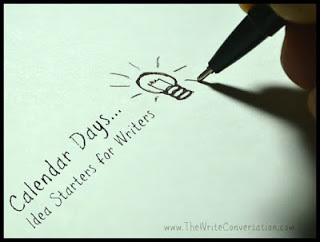 It’s time again for Calendar Days. These are just fun to read. They’re also a great way to jumpstart our creativity when looking for ideas for articles and blog posts. They’re also a fun writing prompt idea.
In addition, calendar days are great conversation starters for social media sites like Facebook and Twitter, especially when two contrasting holidays fall on the same date. Here are some that tickled my funny bone this month:February 1 is both
Dump Your Significant Jerk Day
and
Change Your Password Day
. I’d definitely link those together. Doesn’t it strike you a little ironic that February 13 is both
Desperation Day
and
Madly in Love with Me Day
? February 17 is
My Way Day
so it only makes sense it would also be
Random Acts of Kindness Day
—would you kindly accede to my way of doing things? Finally, February 26 is
Tell a Fairy Tale Day
and
Personal Chef Day
. If I told you I had a personal chef that would be a whopper of a fairy tale.
It’s time again for Calendar Days. These are just fun to read. They’re also a great way to jumpstart our creativity when looking for ideas for articles and blog posts. They’re also a fun writing prompt idea.
In addition, calendar days are great conversation starters for social media sites like Facebook and Twitter, especially when two contrasting holidays fall on the same date. Here are some that tickled my funny bone this month:February 1 is both
Dump Your Significant Jerk Day
and
Change Your Password Day
. I’d definitely link those together. Doesn’t it strike you a little ironic that February 13 is both
Desperation Day
and
Madly in Love with Me Day
? February 17 is
My Way Day
so it only makes sense it would also be
Random Acts of Kindness Day
—would you kindly accede to my way of doing things? Finally, February 26 is
Tell a Fairy Tale Day
and
Personal Chef Day
. If I told you I had a personal chef that would be a whopper of a fairy tale.
February Holidays, Special Days & Downright Crazy Days
February is:Bake for Family Fun MonthNational Black History MonthLibrary Lovers MonthAn Affair to Remember MonthGrapefruit MonthBird Feeding MonthHot Breakfast MonthCherry MonthAmerican Heart Month
Weekly CelebrationsWeek 1:Women’s Heart WeekChildren’s Authors and Illustrators WeekJust Say No to PowerPoint WeekInternational Networking WeekInternational Friendship Week
Week 2:Congenital Heart Defect Awareness WeekHave a Heart for a Chained Dog WeekRisk Awareness WeekLove Makes the World Go Round; But, Laughter Keeps us From Getting Dizzy WeekJell-O Week
Week 3:Brotherhood/Sisterhood WeekBuild a Better Trade Show Image WeekNational Engineers WeekNational Justice for Animals WeekNational Entrepreneurship WeekTexas Cowboy Poetry Week
Week 4:National Secondhand Wardrobe WeekPeace Corps WeekNational Eating Disorders Awareness Week
Daily CelebrationsFebruary 1Car Insurance DayDump Your Significant Jerk DaySerpent DayChange Your Password DayG.I. Joe DayBaked Alaska DayFreedom DayRobinson Crusoe DaySpunky Old Broads DayDecorating with Candy Day
February 2Groundhog DaySled Dog DayMarmot DayHedgehog DayWorld Play Your Ukulele DayCrepe Day
February 3Carrot Cake DayFour Chaplains Memorial DayThe Day the Music Died
February 4Homemade Soup DayUSO DayStuffed Mushroom DayFacebook’s BirthdayLiberace DayQuaker DayWorld Cancer DayThank a Mailman Day
February 5Nutella DayBubble Gum DayDoodle DayChocolate Fondue DayWeatherman’s DayWestern Monarch Butterfly Day
February 6Lame Duck DayLace DayFrozen Yogurt DayTake Your Child to the Library Day
February 7Send a Card to a Friend DayPopcorn DayWave All Your Fingers at Your Neighbors DayEday (math)Ballet Day
February 8Laugh and Get Rich DayChinese New YearMolasses Bar DayClean Out Your Computer DayBoy Scout Anniversary DayOpera DayKite Flying Day
February 9Toothache DayRead in the Bathtub DayExtraterrestrial DayStop bullying Day
February 10Umbrella DayPlimsoll Day
February 11Don’t Cry Over Spilled Milk DayNational Inventors DayWhite Shirt Day Get Out Your Guitar DayPro Sports Wives DayBe Electric DaySatisfied Staying Single DayMake a Friend’s Day
February 12Lincoln’s BirthdayLost Penny DayPaul Bunyan DaySafety Pup DayDarwin DayPlum Pudding Day
February 13World Radio DayWorld Whale DayDesperation DayMadly in Love with me DayGet a Different Name DayEmployee Legal Awareness Day
February 14Library Lovers DayInternational Book Giving DayNational Have a Heart DayCream-filled Chocolates DayPet Theft Awareness DayValentines DayNational Organ Donor DayFerris Wheel Day
February 15Susan B. Anthony DayNational Gumdrop DayNational Hippo DayRemember the Maine Day
February 16National Almond DayDo a Grouch a Favor DayPresidents DayInnovation Day
February 17My Way DayChampion Crab Races DayNational PTA Founders DayDigital Learning DayRandom Acts of Kindness Day
February 18Pluto DayIce Cream for Breakfast DayCow Milked While Flying in an Airplane DayBattery Day
February 19Chocolate Mint DayLashes Day
February 20Cherry Pie DayHoodie Hoo DayWorld Day for Social JusticeLove Your Pet Day
February 21Sticky Bun DayInformation Architecture DaySingle Tasking DayInternational Mother Language Day
February 22George Washington’s BirthdayBe humble DayWalking the Dog DayCook a Sweet Potato DayInternational World Thinking Day
February 23National Dog Biscuit DayPlay Tennis DayBanana Bread DayCurling is Cool DayIwo Jima DayDiesel Engine Day
February 24Tortilla Chip DayNational Cupcake Day (Canada)Inconvenience Yourself Day
February 25Clam Chowder DayChili DayIntroduce a Girl to Engineering DayChocolate-covered Peanuts Day
February 26World Pistachio DayPersonal Chef DayBacon DayFor Pete’s Sake DayLevi Strauss DayTell a Fairy Tale Day
February 27International Polar Bear DayWorld Sword Swallowers DayDay of ActionN Brainer DayStrawberry Day
February 28Chocolate Soufflé DayNational Tooth Fairy DayRare Disease DayPublic Sleeping DayFloral Design Day
February 29Leap Year DayRare Disease DayInternational Underlings DayBachelor’s Day
Now let's do a little brainstorming for next month. What are some of your favorite days from the list and how do you propose using them?
Don't forget to join the conversation!Blessings,
Edie
TWEETABLESLooking for a unique #socialmedia update? Calendar Days on @EdieMelson (Click to Tweet)
Need an original article or #blog post topic - Calendar Days is the answer - @EdieMelson (Click to Tweet)
 It’s time again for Calendar Days. These are just fun to read. They’re also a great way to jumpstart our creativity when looking for ideas for articles and blog posts. They’re also a fun writing prompt idea.
In addition, calendar days are great conversation starters for social media sites like Facebook and Twitter, especially when two contrasting holidays fall on the same date. Here are some that tickled my funny bone this month:February 1 is both
Dump Your Significant Jerk Day
and
Change Your Password Day
. I’d definitely link those together. Doesn’t it strike you a little ironic that February 13 is both
Desperation Day
and
Madly in Love with Me Day
? February 17 is
My Way Day
so it only makes sense it would also be
Random Acts of Kindness Day
—would you kindly accede to my way of doing things? Finally, February 26 is
Tell a Fairy Tale Day
and
Personal Chef Day
. If I told you I had a personal chef that would be a whopper of a fairy tale.
It’s time again for Calendar Days. These are just fun to read. They’re also a great way to jumpstart our creativity when looking for ideas for articles and blog posts. They’re also a fun writing prompt idea.
In addition, calendar days are great conversation starters for social media sites like Facebook and Twitter, especially when two contrasting holidays fall on the same date. Here are some that tickled my funny bone this month:February 1 is both
Dump Your Significant Jerk Day
and
Change Your Password Day
. I’d definitely link those together. Doesn’t it strike you a little ironic that February 13 is both
Desperation Day
and
Madly in Love with Me Day
? February 17 is
My Way Day
so it only makes sense it would also be
Random Acts of Kindness Day
—would you kindly accede to my way of doing things? Finally, February 26 is
Tell a Fairy Tale Day
and
Personal Chef Day
. If I told you I had a personal chef that would be a whopper of a fairy tale.February Holidays, Special Days & Downright Crazy Days
February is:Bake for Family Fun MonthNational Black History MonthLibrary Lovers MonthAn Affair to Remember MonthGrapefruit MonthBird Feeding MonthHot Breakfast MonthCherry MonthAmerican Heart Month
Weekly CelebrationsWeek 1:Women’s Heart WeekChildren’s Authors and Illustrators WeekJust Say No to PowerPoint WeekInternational Networking WeekInternational Friendship Week
Week 2:Congenital Heart Defect Awareness WeekHave a Heart for a Chained Dog WeekRisk Awareness WeekLove Makes the World Go Round; But, Laughter Keeps us From Getting Dizzy WeekJell-O Week
Week 3:Brotherhood/Sisterhood WeekBuild a Better Trade Show Image WeekNational Engineers WeekNational Justice for Animals WeekNational Entrepreneurship WeekTexas Cowboy Poetry Week
Week 4:National Secondhand Wardrobe WeekPeace Corps WeekNational Eating Disorders Awareness Week
Daily CelebrationsFebruary 1Car Insurance DayDump Your Significant Jerk DaySerpent DayChange Your Password DayG.I. Joe DayBaked Alaska DayFreedom DayRobinson Crusoe DaySpunky Old Broads DayDecorating with Candy Day
February 2Groundhog DaySled Dog DayMarmot DayHedgehog DayWorld Play Your Ukulele DayCrepe Day
February 3Carrot Cake DayFour Chaplains Memorial DayThe Day the Music Died
February 4Homemade Soup DayUSO DayStuffed Mushroom DayFacebook’s BirthdayLiberace DayQuaker DayWorld Cancer DayThank a Mailman Day
February 5Nutella DayBubble Gum DayDoodle DayChocolate Fondue DayWeatherman’s DayWestern Monarch Butterfly Day
February 6Lame Duck DayLace DayFrozen Yogurt DayTake Your Child to the Library Day
February 7Send a Card to a Friend DayPopcorn DayWave All Your Fingers at Your Neighbors DayEday (math)Ballet Day
February 8Laugh and Get Rich DayChinese New YearMolasses Bar DayClean Out Your Computer DayBoy Scout Anniversary DayOpera DayKite Flying Day
February 9Toothache DayRead in the Bathtub DayExtraterrestrial DayStop bullying Day
February 10Umbrella DayPlimsoll Day
February 11Don’t Cry Over Spilled Milk DayNational Inventors DayWhite Shirt Day Get Out Your Guitar DayPro Sports Wives DayBe Electric DaySatisfied Staying Single DayMake a Friend’s Day
February 12Lincoln’s BirthdayLost Penny DayPaul Bunyan DaySafety Pup DayDarwin DayPlum Pudding Day
February 13World Radio DayWorld Whale DayDesperation DayMadly in Love with me DayGet a Different Name DayEmployee Legal Awareness Day
February 14Library Lovers DayInternational Book Giving DayNational Have a Heart DayCream-filled Chocolates DayPet Theft Awareness DayValentines DayNational Organ Donor DayFerris Wheel Day
February 15Susan B. Anthony DayNational Gumdrop DayNational Hippo DayRemember the Maine Day
February 16National Almond DayDo a Grouch a Favor DayPresidents DayInnovation Day
February 17My Way DayChampion Crab Races DayNational PTA Founders DayDigital Learning DayRandom Acts of Kindness Day
February 18Pluto DayIce Cream for Breakfast DayCow Milked While Flying in an Airplane DayBattery Day
February 19Chocolate Mint DayLashes Day
February 20Cherry Pie DayHoodie Hoo DayWorld Day for Social JusticeLove Your Pet Day
February 21Sticky Bun DayInformation Architecture DaySingle Tasking DayInternational Mother Language Day
February 22George Washington’s BirthdayBe humble DayWalking the Dog DayCook a Sweet Potato DayInternational World Thinking Day
February 23National Dog Biscuit DayPlay Tennis DayBanana Bread DayCurling is Cool DayIwo Jima DayDiesel Engine Day
February 24Tortilla Chip DayNational Cupcake Day (Canada)Inconvenience Yourself Day
February 25Clam Chowder DayChili DayIntroduce a Girl to Engineering DayChocolate-covered Peanuts Day
February 26World Pistachio DayPersonal Chef DayBacon DayFor Pete’s Sake DayLevi Strauss DayTell a Fairy Tale Day
February 27International Polar Bear DayWorld Sword Swallowers DayDay of ActionN Brainer DayStrawberry Day
February 28Chocolate Soufflé DayNational Tooth Fairy DayRare Disease DayPublic Sleeping DayFloral Design Day
February 29Leap Year DayRare Disease DayInternational Underlings DayBachelor’s Day
Now let's do a little brainstorming for next month. What are some of your favorite days from the list and how do you propose using them?
Don't forget to join the conversation!Blessings,
Edie
TWEETABLESLooking for a unique #socialmedia update? Calendar Days on @EdieMelson (Click to Tweet)
Need an original article or #blog post topic - Calendar Days is the answer - @EdieMelson (Click to Tweet)
Published on February 02, 2016 01:00
February 1, 2016
Is Blogging Still Relevant for Writers & Authors
by Edie Melson @EdieMelson
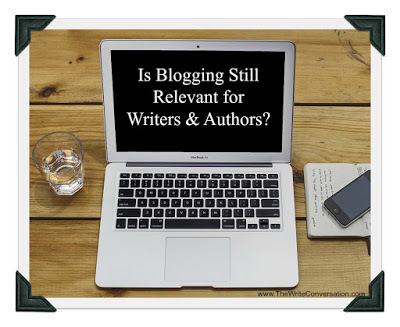 Recently, I’ve fielded a flurry of questions asking if blogging is still worthwhile for writers and authors.
Recently, I’ve fielded a flurry of questions asking if blogging is still worthwhile for writers and authors.
If anything, I believe it’s more important.
There have been so many changes on social media—with new algorithms, rules, and changes—it has never been more critical for us to have a stable place for our audience to always be able to find us.That said, there are also more viable options for writers when it comes to blogging choices. Being part of a focused group blog can be one excellent solution for authors who don’t want the responsibility of managing a solo site.
Here are some other things you may not have thought about when it comes to blogging:1. An unfocused blog is an unread blog. Many writers have the mistaken idea that narrowing the focus of a blog will narrow the audience. Although it seems counterintuitive, the exact opposite is true. By focusing our blogs—with a clear purpose and relevant posts—a larger section of our audience will be able to find us.
 People will follow our blogs FIRST because we have
People will follow our blogs FIRST because we have
something interesting to say.2. People will follow our blogs FIRST because we have something interesting to say—not because we’re authors. If you can make writing about writing interesting to your readers , then that’s great. If not, pick another subject matter. Make sure it’s something you enjoy learning/talking about. Otherwise it will quickly become drudgery.
3. Titles and key words MATTER. Gone are the days when we use phone books to find people and businesses. Now everyone uses search engines. And search engines rely on keywords.
Keyword RefresherA keyword is like a label. It's a short way—although almost always more than one word in length—to state the purpose of your article. Articles can have several keyword groups or only one. I only have one main keyword group for this article XXX. You'll see this keyword in the labels following this post. You'll also see some related keywords, XXX.
I use groups of words because the point of the keywords is to direct the searcher to your website. We want our keywords to match—as closely as possible—what someone types or speaks into a search engine search box. People rarely type just one word because it gives too many options.
 Our blogs are our online homes.4. Our blogs are our online homes. Because of that, we’re the ones primarily responsible for making those visiting feel welcome, safe, and comfortable.It’s up to us facility conversation by asking open-ended questions at the end of our posts.If we ask for our readers to be vulnerable with us and each other, we need to demonstrate that level of vulnerability within our posts.Finally, we need to answer the comments left for us. In person, we’d never ask someone a question, then ignore them after they answered. But we frequently do that online.
Our blogs are our online homes.4. Our blogs are our online homes. Because of that, we’re the ones primarily responsible for making those visiting feel welcome, safe, and comfortable.It’s up to us facility conversation by asking open-ended questions at the end of our posts.If we ask for our readers to be vulnerable with us and each other, we need to demonstrate that level of vulnerability within our posts.Finally, we need to answer the comments left for us. In person, we’d never ask someone a question, then ignore them after they answered. But we frequently do that online.
5. We must make sure it’s easy for our readers to return. This means we need to have a prominent place for them to either sign up for email updates or RSS feed when a new blog is posted. It’s also important for them to be able to connect with us further through social media, so we need to have those buttons in our sidebar as well.
Bottom LineBlogging is important because we need a way for our audience to find us that doesn’t rely on the whims of social media network. But it doesn’t have to make us miserable. Play around with some options and find one that works best for you.
I’d love to know what is working for you now. Be sure to leave your thoughts in the comments section below.
Don’t forget to join the conversation!Blessings,Edie
TWEETABLESIs #blogging still relevant for writers & authors? @EdieMelson shares her thoughts (Click to Tweet)
With the whims of social media, blogging is more important than ever to writers - @EdieMelson (Click to Tweet)
 Recently, I’ve fielded a flurry of questions asking if blogging is still worthwhile for writers and authors.
Recently, I’ve fielded a flurry of questions asking if blogging is still worthwhile for writers and authors. If anything, I believe it’s more important.
There have been so many changes on social media—with new algorithms, rules, and changes—it has never been more critical for us to have a stable place for our audience to always be able to find us.That said, there are also more viable options for writers when it comes to blogging choices. Being part of a focused group blog can be one excellent solution for authors who don’t want the responsibility of managing a solo site.
Here are some other things you may not have thought about when it comes to blogging:1. An unfocused blog is an unread blog. Many writers have the mistaken idea that narrowing the focus of a blog will narrow the audience. Although it seems counterintuitive, the exact opposite is true. By focusing our blogs—with a clear purpose and relevant posts—a larger section of our audience will be able to find us.
 People will follow our blogs FIRST because we have
People will follow our blogs FIRST because we havesomething interesting to say.2. People will follow our blogs FIRST because we have something interesting to say—not because we’re authors. If you can make writing about writing interesting to your readers , then that’s great. If not, pick another subject matter. Make sure it’s something you enjoy learning/talking about. Otherwise it will quickly become drudgery.
3. Titles and key words MATTER. Gone are the days when we use phone books to find people and businesses. Now everyone uses search engines. And search engines rely on keywords.
Keyword RefresherA keyword is like a label. It's a short way—although almost always more than one word in length—to state the purpose of your article. Articles can have several keyword groups or only one. I only have one main keyword group for this article XXX. You'll see this keyword in the labels following this post. You'll also see some related keywords, XXX.
I use groups of words because the point of the keywords is to direct the searcher to your website. We want our keywords to match—as closely as possible—what someone types or speaks into a search engine search box. People rarely type just one word because it gives too many options.
 Our blogs are our online homes.4. Our blogs are our online homes. Because of that, we’re the ones primarily responsible for making those visiting feel welcome, safe, and comfortable.It’s up to us facility conversation by asking open-ended questions at the end of our posts.If we ask for our readers to be vulnerable with us and each other, we need to demonstrate that level of vulnerability within our posts.Finally, we need to answer the comments left for us. In person, we’d never ask someone a question, then ignore them after they answered. But we frequently do that online.
Our blogs are our online homes.4. Our blogs are our online homes. Because of that, we’re the ones primarily responsible for making those visiting feel welcome, safe, and comfortable.It’s up to us facility conversation by asking open-ended questions at the end of our posts.If we ask for our readers to be vulnerable with us and each other, we need to demonstrate that level of vulnerability within our posts.Finally, we need to answer the comments left for us. In person, we’d never ask someone a question, then ignore them after they answered. But we frequently do that online.5. We must make sure it’s easy for our readers to return. This means we need to have a prominent place for them to either sign up for email updates or RSS feed when a new blog is posted. It’s also important for them to be able to connect with us further through social media, so we need to have those buttons in our sidebar as well.
Bottom LineBlogging is important because we need a way for our audience to find us that doesn’t rely on the whims of social media network. But it doesn’t have to make us miserable. Play around with some options and find one that works best for you.
I’d love to know what is working for you now. Be sure to leave your thoughts in the comments section below.
Don’t forget to join the conversation!Blessings,Edie
TWEETABLESIs #blogging still relevant for writers & authors? @EdieMelson shares her thoughts (Click to Tweet)
With the whims of social media, blogging is more important than ever to writers - @EdieMelson (Click to Tweet)
Published on February 01, 2016 01:00
January 30, 2016
Where Our Words Come From...
I'm back on faculty at Weekend with the Writers. I'm always inspired by author, Kristen Heitzmann, an amazing award-winning writer. I sat in on her class and found my passion for writing reignited. Here's one of the quotes that reminded me of exactly why I write.
 Writing Draws from our Imaginations the filaments to spin a web that
Writing Draws from our Imaginations the filaments to spin a web that
Snares & Captivates - Kristen HeitzmannI'd love to know how you feel when you write.
Share your thoughts in the comment section below.
I also invite you to use this image any way you like online. Post it to your blog, share it on Facebook, Twitter, Pinterest, anywhere you'd like. All I ask is that you keep it intact, with my website watermark visible.
Don't forget to join the conversation!Blessings,
Edie
 Writing Draws from our Imaginations the filaments to spin a web that
Writing Draws from our Imaginations the filaments to spin a web that Snares & Captivates - Kristen HeitzmannI'd love to know how you feel when you write.
Share your thoughts in the comment section below.
I also invite you to use this image any way you like online. Post it to your blog, share it on Facebook, Twitter, Pinterest, anywhere you'd like. All I ask is that you keep it intact, with my website watermark visible.
Don't forget to join the conversation!Blessings,
Edie
Published on January 30, 2016 05:44
January 29, 2016
13 Truths About Being a Writer
by Edie Melson @EdieMelson
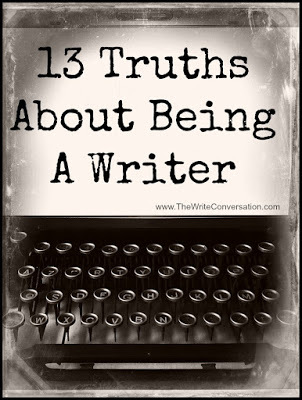 13 Truths about being a writer.Choosing to stand up and be identified as a writer can be a scary thing. The road is rarely a straight path to publication. These are some things that I hope will help you stay the course as you continue on your own writing journey
13 Truths about being a writer.Choosing to stand up and be identified as a writer can be a scary thing. The road is rarely a straight path to publication. These are some things that I hope will help you stay the course as you continue on your own writing journey
13 Truths About Being a Writer1. It’s an eternal struggle between you and the blank page. Unfortunately, it doesn’t get a whole lot easier. The doubts still crowd your mind, and fear still whispers in your ear no matter how long you’re in this business.
2. Talent without persistence is worthless. So much of what we need to know to be successful, no matter what our goals, can be learned.
3. You’re stronger than you think. If I had known when I started, the hard work and emotional toll getting to this point would take. I would have quite because I would never have dreamed I could do it.
 You can't plot a course always expecting to be
You can't plot a course always expecting to be
the exception to the rule.4. You can’t plot a course always expecting to be the exception to the rule. Things generally happen in a certain way, over a certain time-frame. As believers we know that God can step in at any time and turn things upside down. But expecting that to always happen just isn’t reasonable. We need to do the work and celebrate when the exceptions do occur.
5. Quitting is the only path to failure. I’ve found writing success, but a lot of it has come simply because I refused to give up.
6. God is the One who directs my path—and yours. I can (and will continue) to make plans—but I stay flexible. I would never have even dreamed of the opportunities God has given me.
7. There’s a big difference between goals and dreams. They both have their place in the writer’s life, but a goal is something who’s outcome I can influence. A dream is something I wish would happen. It’s the difference between having the goal of getting a book published or having a best seller. I can achieve the first by hard work, but the second is ultimately up to God.
8. Detours aren’t the same thing as roadblocks. My path to publication has zigged and zagged so many times it looks like the path Mother Goose’s Crooked Old Man left behind. But more frequently than not, those detours ended up getting me further ahead, faster.
9. Change is the industry standard in publishing. It’s not possible to base your path on what has gone before. Technology is moving too fast. We either embrace the challenge or we fall by the wayside.
10. Generosity will always get you farther than selfishness. I have never once regretted putting someone else before me. I’d even go so far as to say that I’ve build my career (or at least my platform) by promoting others.
 Your reputation is worth solid gold.11. Your reputation is worth solid gold, but it’s not something I can buy. I can only achieve it and keep it by guarding it. I always try to communicate honestly and above all, keep my word.
Your reputation is worth solid gold.11. Your reputation is worth solid gold, but it’s not something I can buy. I can only achieve it and keep it by guarding it. I always try to communicate honestly and above all, keep my word.
12. The joy is in the journey. The people I’ve met, the things I’ve gotten to experience have been the high points, not the achievements.
13. Publication isn’t the sole definition of writing success. Touching someone’s life through the words I pen, whether it’s on a blog or a book or an article, is way more important than a book contract.
These are just a few of the things I wish I’d known when I started. I think my expectations would have been more realistic and the heartbreak a little less frequent. Although it could be that someone did, and I just wasn’t paying attention.
What about you?
Has writing taught you anything important about yourself and/or about life? Share your thoughts below.
Don't forget to join the conversation!
Blessings,
Edie
TWEETABLES
13 Truths About Being a Writer - via @EdieMelson (Click to Tweet)
Detours aren’t the same thing as roadblocks—in the #writing journey—or in life @EdieMelson (Click to Tweet)
 13 Truths about being a writer.Choosing to stand up and be identified as a writer can be a scary thing. The road is rarely a straight path to publication. These are some things that I hope will help you stay the course as you continue on your own writing journey
13 Truths about being a writer.Choosing to stand up and be identified as a writer can be a scary thing. The road is rarely a straight path to publication. These are some things that I hope will help you stay the course as you continue on your own writing journey13 Truths About Being a Writer1. It’s an eternal struggle between you and the blank page. Unfortunately, it doesn’t get a whole lot easier. The doubts still crowd your mind, and fear still whispers in your ear no matter how long you’re in this business.
2. Talent without persistence is worthless. So much of what we need to know to be successful, no matter what our goals, can be learned.
3. You’re stronger than you think. If I had known when I started, the hard work and emotional toll getting to this point would take. I would have quite because I would never have dreamed I could do it.
 You can't plot a course always expecting to be
You can't plot a course always expecting to be the exception to the rule.4. You can’t plot a course always expecting to be the exception to the rule. Things generally happen in a certain way, over a certain time-frame. As believers we know that God can step in at any time and turn things upside down. But expecting that to always happen just isn’t reasonable. We need to do the work and celebrate when the exceptions do occur.
5. Quitting is the only path to failure. I’ve found writing success, but a lot of it has come simply because I refused to give up.
6. God is the One who directs my path—and yours. I can (and will continue) to make plans—but I stay flexible. I would never have even dreamed of the opportunities God has given me.
7. There’s a big difference between goals and dreams. They both have their place in the writer’s life, but a goal is something who’s outcome I can influence. A dream is something I wish would happen. It’s the difference between having the goal of getting a book published or having a best seller. I can achieve the first by hard work, but the second is ultimately up to God.
8. Detours aren’t the same thing as roadblocks. My path to publication has zigged and zagged so many times it looks like the path Mother Goose’s Crooked Old Man left behind. But more frequently than not, those detours ended up getting me further ahead, faster.
9. Change is the industry standard in publishing. It’s not possible to base your path on what has gone before. Technology is moving too fast. We either embrace the challenge or we fall by the wayside.
10. Generosity will always get you farther than selfishness. I have never once regretted putting someone else before me. I’d even go so far as to say that I’ve build my career (or at least my platform) by promoting others.
 Your reputation is worth solid gold.11. Your reputation is worth solid gold, but it’s not something I can buy. I can only achieve it and keep it by guarding it. I always try to communicate honestly and above all, keep my word.
Your reputation is worth solid gold.11. Your reputation is worth solid gold, but it’s not something I can buy. I can only achieve it and keep it by guarding it. I always try to communicate honestly and above all, keep my word.
12. The joy is in the journey. The people I’ve met, the things I’ve gotten to experience have been the high points, not the achievements.
13. Publication isn’t the sole definition of writing success. Touching someone’s life through the words I pen, whether it’s on a blog or a book or an article, is way more important than a book contract.
These are just a few of the things I wish I’d known when I started. I think my expectations would have been more realistic and the heartbreak a little less frequent. Although it could be that someone did, and I just wasn’t paying attention.
What about you?
Has writing taught you anything important about yourself and/or about life? Share your thoughts below.
Don't forget to join the conversation!
Blessings,
Edie
TWEETABLES
13 Truths About Being a Writer - via @EdieMelson (Click to Tweet)
Detours aren’t the same thing as roadblocks—in the #writing journey—or in life @EdieMelson (Click to Tweet)
Published on January 29, 2016 01:00



